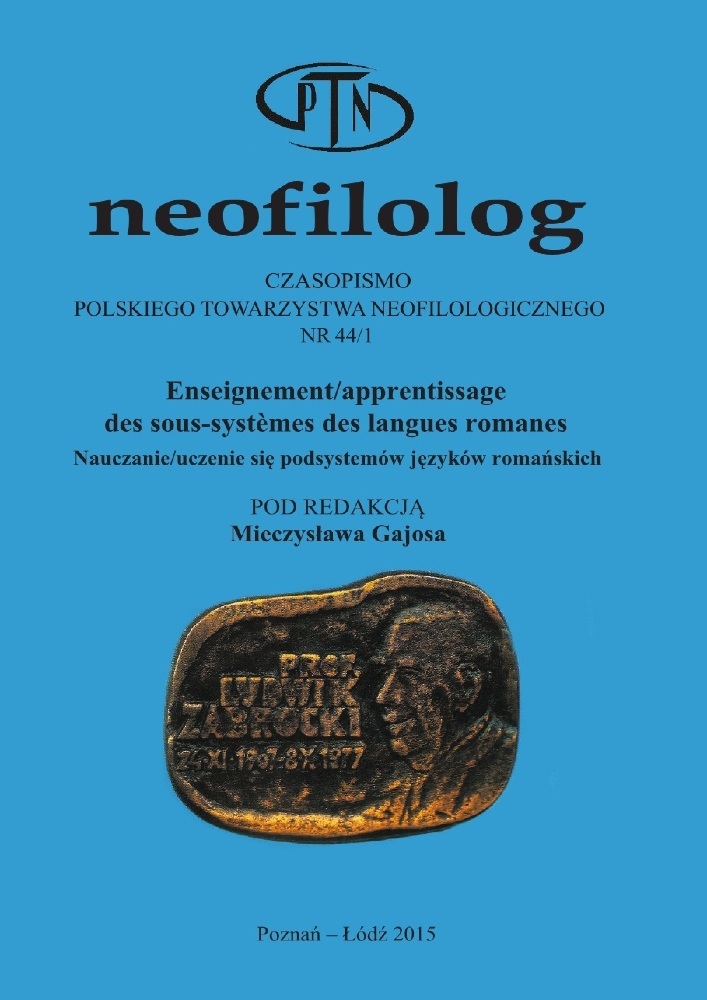Abstrakt
This article presents an analysis of two types of future tense in French within an “intersubjective” approach as an alternative to descriptions based on “objective” or “subjective” considerations. We put forward a hypothesis that the composed form (e.g. on va comprendre) focalizes the verb or the predicate, whereas the simple form (e.g. on comprendra) allows to “defocalize” the verb in order to indicate that the interlocutor’s attention is to be focused elsewhere: either on another part of the predicate (e.g. a complement) or on another part of the utterance, beyond the predicate or even beyond the given sentence. We show that the objective and subjective considerations used to describe these forms may be reinterpreted within the intersubjective approach and concealed with the proposed notion of “(de)focalization”.Bibliografia
Bakhtine, M. 2006. Le marxisme et la philosophie du langage. Essai d’application de la méthode sociologique en linguistique. Paris: Les Éditions de Minuit.
Barbazan, M. 2010. «Comment choisir le meilleur des futurs? Contraintes et libertés d’usage pour le Futur Simple et le Futur Composé (aller + infinitif)». Information Grammaticale, 127: 3-9.
Douay, C. 2000. Éléments pour une théorie de l’interlocution. Un autre regard sur la grammaire anglaise. Rennes: Presses Universitaires de Rennes.
Franckel, J.-J. 1984. «Futur ‘simple’ et futur ‘proche’». Le Français dans le Monde, 182: 65-70.
Gardiner, A. H. 1989. Langage et acte de langage. Aux sources de la pragmatique. Lille: Presses Universitaires de Lille.
Jacques, F. 1985. L’espace logique de l’interlocution. Dialogiques II. Paris: PUF.
Lebas-Fraczak, L. 2010. «La forme être en train de comme éclairage de la fonction de l’imparfait». Cahiers Chronos, 21, Temps, aspect et modalité en français: 161-179.
Lebas-Fraczak, L. 2011. «Morphèmes grammaticaux et cohérence». Cahiers du LRL, 4: 45-63, Presses Universitaires de Blaise Pascal.
Kerbrat-Orecchioni, C. 1999. L’énonciation. De la subjectivité dans le langage. Paris: Armand Colin.
Martin, R. 1983. Pour une logique du sens. Paris: PUF.
Martin, R. 1987. Langage et croyance. Les ‘univers de croyance’ dans la théorie sémantique. Bruxelles: Mardaga.
Nølke, H. 2001. Le regard du locuteur 2. Pour une linguistique des traces énonciatives, Paris: Editions Kimé.
Nølke, H. 2006. «La focalisation: une approche énonciative». Włodarczyk, H. (éd.), La focalisation dans les langues. Paris: L’Harmattan: 59‐80.
Revaz, F. 2009. «Valeurs et emplois du futur simple et du présent prospectif en français». Faits de langues, Le futur, 33: 149-161.
Roussarie, L. Sémanticlopédie. Prédicat. www.semantique-gdr.net/dico/index.php/Accueil.
Schrott, A. 2001. «Le futur périphrastique et l’allure extraordinaire». Cahiers Chronos, 8: 159-170.
Sundell, L.-G. 1991. Le temps futur en français moderne. Stockholm: UPPSALA.
Tomasello, M. 2005. Constructing a Language. A Usage-Based Theory of Language Acquisition. Cambridge, Massachusetts: Harvard University Press.
Vet, C. 1985. «Univers de discours et univers d’énonciation: les temps du passé et du futur». Langue française, 67: 38-58.
Wilmet, M. 1976. Etudes de morpho-syntaxe verbale. Paris: Klincksieck.
Licencja
Prawa autorskie (c) 2019 Lidia Lebas-Frączak

Utwór dostępny jest na licencji Creative Commons Uznanie autorstwa – Bez utworów zależnych 4.0 Międzynarodowe.
Przedstawiany utwór (artykuł) upubliczniany jest na podstawie umowy z autorem i na licencji Creative Commons Attribution-NoDerivatives 4.0 International (CC BY-ND 4.0).
Użytkownicy mają obowiązek podania wraz z rozpowszechnionym utworem, informacji o autorstwie, tytule, źródle (odnośniki do oryginalnego utworu, DOI) oraz samej licencji;
- bez tworzenia utworów zależnych,
- utwór musi być zachowany w oryginalnej postaci.
Uniwersytet im. Adama Mickiewicza w Poznaniu zachowuje prawo do czasopisma jako całości (układ, forma graficzna, tytuł, projekt okładki, logo itp.).
